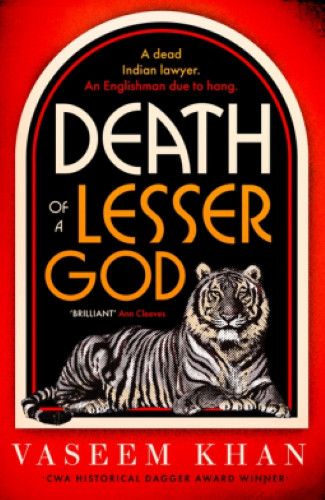By Vaseem Khan https://vaseemkhan.com/ @VaseemKhanUK
Published by Hodder & Stoughton https://www.hodder.co.uk/ @HodderBooks
368 pages ISBN 9781399707602
Publication date 10 August 2023
Death of a Lesser God is the fourth novel in the Malabar House series.
Click on the link to read my review of The Lost Man of Bombay the third novel in the series. The first novel in the series Midnight at Malabar House was the winner of the CWA Historical Dagger award in 2021.
I was allowed access to a pdf review copy on Net Galley https://www.netgalley.com/ @NetGalley. Thanks to the Author and Publisher for organising this and to Alainna from the Publisher for the invitation to participate in the Blog Tour.
The cover
It’s perfect with the arch shape and the slightly odd font giving a mildy exotic feel. Tigers play an important role, both physically and metaphorically, in the novel and so suitably and majestically grace the cover.
From the blurb
Bombay, 1950
James Whitby, sentenced to death for the murder of prominent lawyer and former Quit India activist Fareed Mazumdar, is less than two weeks from a date with the gallows. In a last-ditch attempt to save his son, Whitby’s father, arch-colonialist, Charles Whitby, forces a new investigation into the killing.
The investigation leads Inspector Persis Wadia of the Bombay Police to the old colonial capital of Calcutta, where, with the help of Scotland Yard criminalist Archie Blackfinch, she uncovers a possible link to a second case, the brutal murder of an African-American G.I. during the Calcutta Killings of 1946.
How are the cases connected? If Whitby didn’t murder Mazumdar, then who did? And why?
My thoughts
Death of a Lesser God is the fourth novel in the series centred on the police station where the misfit officers of Bombay are sent to keep them out of the way, if not out of mischief. I’m pleased to say not an awful lot has changed, so fans of the series know what to expect.
Inspector Persis Wadia is the first female officer in the Indian police service, a move seen as enlightened and forward thinking by politicians, but the reality is this bastion of masculinity has no idea what to do with her. So, she finds herself sidelined into the backwater of Malabar House where problems are parked and careers go to die, hopefully quietly. Except Persis is headstrong, driven and a very good detective, a combination that makes her difficult to control after the countrywide publicity of her appointment. She is developing a track record of solving difficult cases despite the obstacles put in her way, so the best they can do is try to manage her expectations. Here she is given the task of an off-the-books style investigation into the case of James Whitby who is due to be executed in eleven days for the murder of an Indian lawyer. This investigation is instigated thanks to the intervention of his wealthy businessman father Charles. Thereby clearly demonstrating that even after independence, the wealth, power and influence of white men still holds sway with the new establishment.
The regular cast of characters also appear too. Her father Sam is away on his honeymoon and so is busy making the lives of everyone he meets miserable, so we read about brief cantankerous outbursts of his. Criminalist Archie Blackfinch is touring India helping to set up crime labs in major cities, but of course he is on hand to provide case cracking insight. He is not the only man seeking Persis’ affections though, as she crosses paths with her much changed cousin Darius, who aunt Nussie has been trying to matchmake her with for years. Persis’ young ward Seema is looking after Sam’s bookstore, making changes, successful ones at that, which are going to shock him on his return. When Persis must work solo on the case, Seema pleads to join her and together, they get into much hot water. We also see another side of Seema a welcome addition to a nicely forming character, one that helps to keep Persis grounded to reality.
The timing of the stories is critical in making it such a fascinating series. The immediate post WWII period was one of great upheaval across the globe, whilst the fighting didn’t encroach much into Indian territory, its men served in the commonwealth armies and there was a devastating famine in Bengal. This was the period of independence for India, which was followed by internal fighting and the partitioning of land on largely religious basis with the formation of Pakistan and East Pakistan (now Bangladesh). A huge mixing pot of faith, ethnicity, class and caste that is liable to boil over at any time is artfully used by the author to bring colour, depth and complexity to his stories. He deftly marshals multiple strands to produce a story that is fascinating, informative, nuanced and above all entertaining.
The central nub of the story appears at the beginning as a question before the blub; ‘Can a white man receive justice in post-colonial India?’ Persis is of course something of an idealist, a believer in truth and that justice will naturally follow. Something she pursues doggedly, although in this case there are unanticipated consequences and collateral damage of the human kind. In the end we see a chastened and reflective Persis, one who has learned a lesson the hard way. Others are much more sanguine; justice is now for Indians and past injustices at the hands of white colonials are neither forgotten nor forgiven. This however goes against Gandhi’s ideals and making the new rulers no better than the colonials they replaced, something the more enlightened want to avoid. Some whites have left, but what of those like the accused James Whitby who were born in India and know of no other life, are they not Indian too?
The story is packed full of humour, be it situational, dialogue or his speciality the amusing description, such as describing a piece of cheese as being hairier than a Greek grandmother. There are so many of these it almost becomes too much to take in. All great knockabout stuff which helps to lighten a novel packed with serious messages.
India is of course a mini continent, and the reader is treated to much more than just life in Bombay. A good deal of the action happens around Calcutta and here Persis and Seema are very much innocents abroad. Then they become more like fish out of water as they find themselves away from the city. Here in the mangroves, they must battle extreme weather, nature itself and come across doughty and courageous natives. An eye opener, I will say no more…
Intelligent, witty and set in a remarkable country at a momentous time in its history, Death of a Lesser God is everything you want in historical crime fiction.
Death of a Lesser God can be purchased via the Bookshop.org here
The author

Vaseem Khan is the author of two crime series set in India: the Baby Ganesh Agency series, and the Malabar House historical crime novels. His first book, The Unexpected Inheritance of Inspector Chopra, was a Times bestseller and has been translated into 15 languages. Midnight at Malabar House won the CWA Historical Fiction Dagger in 2021. In 2018, he was awarded the Eastern Eye Arts, Culture and Theatre Award for Literature. Vaseem was born in Newham, but spent a decade working in India as a management consultant.
Don’t forget to check out the other reviews on this Blog Tour:

